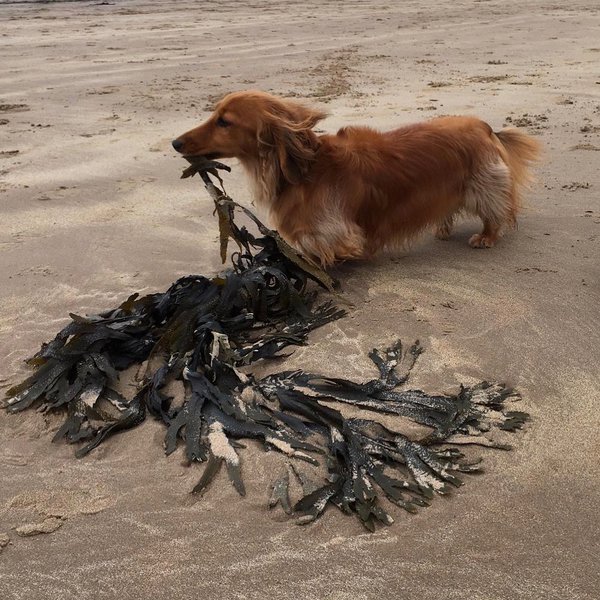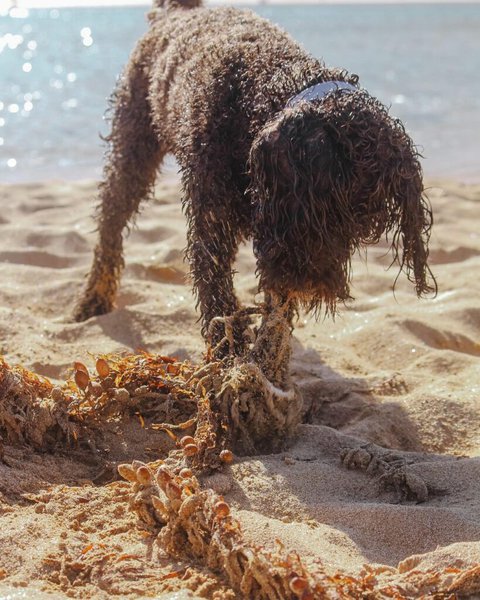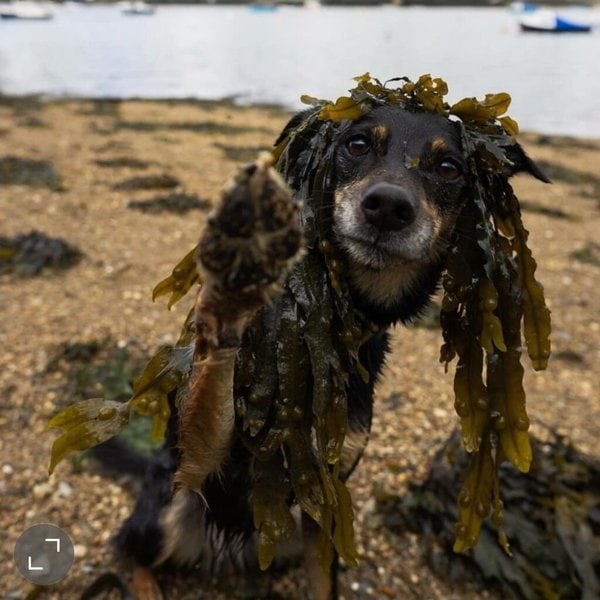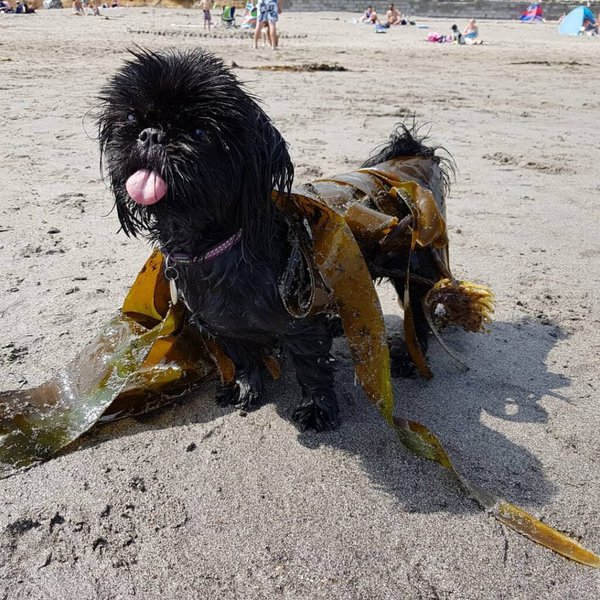The debate around which dried food products are safe for dogs to eat isn’t going anywhere anytime soon. And one such product whose nutritional efficacy and safety for dogs are commonly discussed is seaweed. So, can dogs eat seaweed?
Dogs can certainly eat seaweed, provided it is fed in moderate amounts. Seaweed is rich in several nutrients that can be very beneficial to a pooch’s health, and as an added advantage, it is equally easy for dogs to digest without issues.
Now that we’ve established that seaweed is safe for dogs to eat, what is the best way to feed this plant to dogs? Also, are there any side effects associated with feeding seaweed to dogs? Answers to these, as well as the benefits associated with feeding dogs with seaweed, are provided in today’s article, but before we go further, let’s see when it is safe for dogs to eat seaweed.
Can Dogs Eat Seaweed?

Seaweed, seaweed snacks, and other related products are safe for dogs only when consumed or fed in moderate quantities.
Seaweed is highly nutritious for humans, and it can equally be beneficial for dogs, provided it is fed in the right quantities and prepared in the proper manner.
Seaweed is packed with a ton of nutrients and minerals, and it can be a healthy, natural means of adding these nutrients to your pooch’s diet.
Seaweed is available in various forms, with each differing in taste, texture, nutritional content, and even color, but the variants that are most commonly used in manufacturing dog food products are Kelp and Nori.
How Can I Feed My Dog With Seaweed?
The best way to include seaweed in a pooch’s diet is by using seaweed-based products, such as additives and supplements. Seaweed sheets (also known as Nori) and Kelp are safe for dogs to eat. Nori can be broken down and added to a dog’s meals as a topper.
Snacks and treats produced with seaweed are also safe for dogs to consume, provided they don’t contain ingredients toxic to dogs, such as salt and other spices.
That said, seaweed is best fed to dogs in minimal quantities, and you should, by all means, avoid feeding your canine buddy with wild seaweed. If you’re feeding your dog with seaweed or related products for the first time, it is advisable to monitor the pooch for signs of an allergic reaction.
What Are The Benefits Of Feeding My Dog With Seaweed?

Seaweed is rich in nutrients that are beneficial to a pooch’s health, and the ease with which it is digested also makes it suitable for canine consumption.
Rich Source Of Nutrition
The major benefit attached to feeding dogs with seaweed food products is the presence of multiple beneficial nutrients in this ocean vegetable.
Seaweed is rich in vitamins, such as vitamins A, B1 and B2, C, E, and K, and this plant is also known to contain a decent amount of iodine. Nutrients that are also present in seaweed include calcium, potassium, iron, and manganese.
Vitamins contained in seaweed have special antioxidant properties, and they also help strengthen a dog’s immune system, along with a host of other health benefits.
Also, seaweed contains a healthy amount of omega-3 and omega-6 fatty acids that carry out several important tasks, such as combating kidney and heart diseases, within a pooch’s body.
Easy Digestion
Apart from being nutrient-rich, seafood is typically low in cellulose. Coupled with a simple cell structure, this ensures dogs won’t have issues digesting this ocean vegetable and related food products.
Additionally, seaweed contains prebiotics that provides sustenance for good bacteria living in a dog’s stomach, thereby ensuring that they can comfortably break down ingested food.
Can Seaweed Be Toxic For Dogs?
Seaweed products containing harmful ingredients such as onions and garlic pose a danger to a dog’s health.
With seaweed, there is also a danger of dogs suffering gastrointestinal blockages, salt poisoning, and upset stomach.
Use Of Toxic Ingredients In Manufacturing Seaweed Products
Commercial seaweed products often make use of garlic and onions as manufacturing ingredients, and these can be toxic to pooches when consumed.
Onion consumption typically causes the breakdown of a dog’s red blood cells, which subsequently results in the pooch in question developing anemia.
Similarly, garlic contains compounds that attach to, and destroy blood’s red blood cells, thereby causing hemolytic anemia. Both situations can be fatal for a dog if emergency medical treatment isn’t provided.

Presence Of Pollutants
Seaweed found along the beach typically contains toxins and pollutants that can upset a pooch’s stomach if ingested.
Since seaweed is typically washed ashore, there is every possibility that these plants containing dead critters and other sea creatures can induce a severe allergic reaction in any dog that consumes such seaweed.
Salt Poisoning
Apart from the presence of pollutants, beach seaweed typically contains a significant amount of salt and, when consumed in significant quantities, can develop into salt poisoning for the pooch.
Salt poisoning, due to consumption of seaweed containing seawater, typically results in a dog’s body needing large amounts of water to even out the increased levels of salt in the blood.
Failure of a pooch suffering from salt poisoning to meet up with the water demand consequently results in symptoms such as dizziness, seizures, breathing difficulties, confusion and fainting. Serious cases of salt poisoning, if not treated immediately, can result in coma and death.
Gastrointestinal Obstruction
Dried wild seaweed, when ingested, expands upon coming in contact with stomach fluids; Hence, feeding this to a dog will place such a pooch at risk of suffering from intestinal blockages.
The expanded seaweed typically blocks the blood supply to the dog’s intestines and, in most cases, also proceeds to rupture the intestine, thereby causing severe injury to the dog in question.
What Should I Do If My Dog Eats Seaweed?
Emergency medical attention should be provided for a dog that has eaten seaweed found on the beach, while dogs that are being fed with seaweed products for the first time should be observed for signs of seaweed poisoning.
Contact Your Vet
Suppose you suspect that your canine buddy has eaten significant amounts of seaweed from the beach, the immediate course of action is to contact your vet, regardless of whether or not the pooch is showing symptoms of poisoning.
There is a huge chance that beach seaweed ingested by the dog contains harmful substances, and prompt action is important to ensure that such a pooch doesn’t suffer fatal consequences.
Treatment for excessive seaweed consumption depends on the amount of the ingested seaweed, as well as the severity of the pooch’s condition. In some cases, surgery may be required and necessary to get rid of ingested seaweed from the dog’s stomach.

Watch Out For Signs Of Seaweed Toxicity
Suppose you are going to include seaweed in your pooch’s diet for the first time. In that case, you should monitor such a pooch for any unusual symptoms and contact your vet immediately if you notice anything out of the ordinary.
That said, some of the signs that are commonly exhibited by dogs suffering from seaweed toxicity include:





